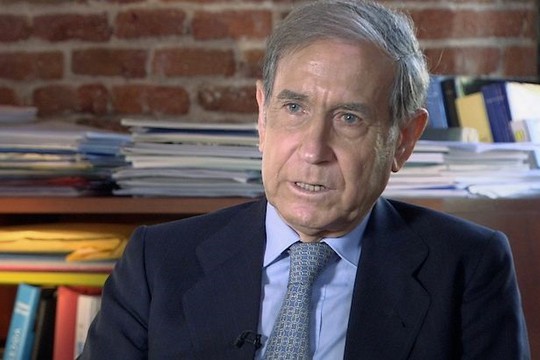Shlomo Ben-Ami
Sooner or later, Israeli Prime Minister Binyamin Netanyahu’s destructive political magic, which has kept him in power for 15 years, was bound to usher in a major tragedy. A year ago, he formed the most radical and incompetent government in Israel’s history. Don’t worry, he assured his critics, I have “two hands firmly on the steering wheel.
But by ruling out any political process in Palestine and boldly asserting, in his government’s binding guidelines, that “the Jewish people have an exclusive and inalienable right to all parts of the Land of Israel,” Netanyahu’s fanatical government made bloodshed inevitable, writes Shlomo Ben-Ami, a former Israeli diplomat, politician, and historian.
Admittedly, blood flowed in Palestine even when peace-seekers such as Yitzhak Rabin and Ehud Barak were in office. But Netanyahu recklessly invited violence by paying his coalition partners any price for their support. He let them grab Palestinian lands, expand illegal settlements, scorn Muslim sensibilities regarding the sacred mosques on the Temple Mount, and promote suicidal delusions about the reconstruction of the biblical Temple in Jerusalem (in itself a recipe for what could be the mother of all Muslim Jihads). Meanwhile, he also sidelined the more moderate Palestinian leadership of Mahmoud Abbas in the West Bank, effectively beefing up the radical Hamas in Gaza.
But, in the ruthless, barbaric massacre of Israeli civilians in the villages surrounding Gaza, Netanyahu’s hubris met its nemesis in the form of Hamas’s savagery. Fifty years and a day after Egypt and Syria launched their surprise attack in what became known as the Yom Kippur War, Hamas stormed Gaza’s borders with Israel and slaughtered hundreds of defenseless civilians. Scenes of young women raped next to the bodies of their friends were recorded on social networks. About a hundred people – among them whole families, elderly women, and toddlers – have been abducted and taken to Gaza.
The attack by Hamas was not just a tactical surprise, but also a strategic bombshell. This was apparent in the group’s calculated decision not to participate in any of the clashes of the last two years between Israel and Islamic Jihad, another militant group in Gaza. Hamas was creating the impression that it was becoming a government more interested in meeting its people’s material needs than in presumably ineffective armed resistance. And the Israelis believed what they wanted to believe: that subsidies from Qatar and their own gestures would dissuade Hamas from future military adventures.
And now what? Restore deterrence? How, exactly? Self-punishment in the form of a renewed occupation of Gaza? A land invasion is difficult to imagine. The atrocious level of destruction and casualties this would entail is one reason, with the many Israeli hostages now in Gaza providing additional insurance. The risk of Hezbollah opening an additional front from Lebanon in the north is another. Hezbollah’s capabilities dwarf those of Hamas, and a two-front war, with Iran possibly backing Israel’s foes, is an apocalyptic scenario.
This is exactly why US President Joe Biden warned Israel’s enemies “not to exploit the crisis.” To drive home the point, Biden has ordered the US Navy’s newest and most advanced aircraft carrier to the eastern Mediterranean.
But then when has the Israel-Palestine conflict ever responded to Cartesian logic?
When the fighting ends, negotiations for an exchange of hostages and prisoners are inevitable. Possibly, the clearly ineffective blockade on Gaza should be lifted. In any case, a different question will remain: whether the barbarity that the Hamas militias displayed in the killing fields around Gaza is the right path to Palestinian redemption. Their moment of supposed glory will live in infamy for many years to come.
read more in our Telegram-channel https://t.me/The_International_Affairs

 8:37 21.10.2023 •
8:37 21.10.2023 •























